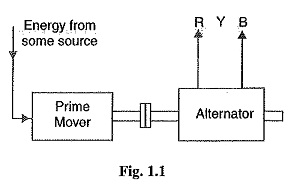Electrical Energy Definition:
Electrical Energy Definition states that energy is the basic necessity for the economic development of a country. Many functions necessary to present-day living grind to halt when the supply of energy stops. It is practically impossible to estimate the actual magnitude of the part that energy has played in the building up of present-day civilisation. The availability of huge amount of energy in the modern times has resulted in a shorter working day, higher agricultural and industrial production, a healthier and more balanced diet and better transportation facilities. As a matter of fact, there is a close relationship between the energy used per person and his standard of living. The greater the per capita consumption of energy in a country, the higher is the standard of living of its people.
Energy exists in different forms in nature but the most important form is the electrical energy. The modem society is so much dependent upon the use of electrical energy that it has become a part and parcel of our life.
Importance of Electrical Energy:
Energy may be needed as heat, as light, as motive power etc. The present-day advancement in science and technology has made it possible to convert electrical energy into any desired form. This has given Electrical Energy Definition a place of pride in the modern world. The survival of industrial undertakings and our social structures depends primarily upon low cost and uninterrupted supply of electrical energy. In fact, the advancement of a country is measured in terms of per capita consumption of electrical energy.
Electrical energy is superior to all other forms of energy due to the following reasons:
1. Convenient form:
Electrical Energy Definition also states that, it is a very convenient form of energy. It can be easily converted into other forms of energy. For example, if we want to convert electrical energy into heat, the only thing to be done is to pass electrical current through a wire of high resistance g., a heater. Similarly, electrical energy can be converted into light (e.g. electric bulb), mechanical energy (e.g. electric motors) etc.
2. Easy control:
The electrically operated machines have simple and convenient starting, control and operation. For instance, an electric motor can be started or stopped by turning on or off a switch. Similarly, with simple arrangements, the speed of electric motors can be easily varied over the desired
3. Greater flexibility:
One important reason for preferring electrical energy is the flexibility that it offers. It can be easily transported from one place to another with the help of conductors.
4. Cheapness:
Electrical energy is much cheaper than other forms of energy. Thus it is overall economical to use this form of energy for domestic, commercial and industrial purposes.
5. Cleanliness:
Electrical energy is not associated with smoke, fumes or poisonous gases. Therefore, its use ensures cleanliness and healthy conditions.
6. High transmission efficiency:
The consumers of electrical energy are generally situated quite away from the centres of its production. The electrical energy can be transmitted conveniently and efficiently from the centres of generation to the consumers with the help of overhead conductors known as transmission lines.
Generation of Electrical Energy:
The conversion of energy available in different forms in nature into electrical energy is known as generation of electrical energy.
Electrical energy is a manufactured commodity like clothing, furniture or tools. Just as the manufacture of a commodity involves the conversion of raw materials available in nature into the desired form, similarly electrical energy is produced from the forms of energy available in nature. However, Electrical Energy Definition differs in one important respect. Whereas other commodities may be produced at will and consumed as needed, the electrical energy must be produced and transmitted to the point of use at the instant it is needed. The entire process takes only a fraction of a second. This instantaneous production of electrical energy introduces technical and economical considerations unique to the electrical power industry.
Energy is available in various forms from different natural sources such as pressure head of water, chemical energy of fuels, nuclear energy of radioactive substances etc. All these forms of energy can be converted into electrical energy by the use of suitable arrangements. The arrangement essentially employs (see Fig. 1.1) an alternator coupled to a prime mover.
The prime mover is driven by the energy obtained from various sources such as burning of fuel, pressure of water, force of wind etc. For example, chemical energy of a fuel (e.g., coal) can be used to produce steam at high temperature and pressure. The steam is fed to a prime mover which may be a steam engine or a steam turbine. The turbine converts heat energy of steam into mechanical energy which is further converted into electrical energy by the alternator. Similarly, other forms of energy can be converted into electrical energy by employing suitable machinery and equipment.
